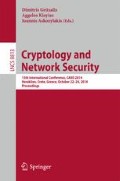Abstract
Since the concept of locally decodable codes was introduced by Katz and Trevisan in 2000 [11], it is well-known that information theoretically secure private information retrieval schemes can be built using locally decodable codes [15]. In this paper, we construct a Byzantine robust PIR scheme using the multiplicity codes introduced by Kopparty et al. [12]. Our main contributions are on the one hand to avoid full replication of the database on each server; this significantly reduces the global redundancy. On the other hand, to have a much lower locality in the PIR context than in the LDC context. This shows that there exists two different notions: LDC-locality and PIR-locality. This is made possible by exploiting geometric properties of multiplicity codes.
Access this chapter
Tax calculation will be finalised at checkout
Purchases are for personal use only
Preview
Unable to display preview. Download preview PDF.
References
Beimel, A., Ishai, Y., Kushilevitz, E., Raymond, J.-F.: Breaking the n 1/(2k − 1) barrier for information-theoretic private information retrieval. In: Chazelle, B. (ed.) The 43rd Annual IEEE Symposium on Foundations of Computer Science, 2002. Proceedings, vol. 59, pp. 261–270 (2002)
Beimel, A., Stahl, Y.: Robust Information-Theoretic Private Information Retrieval. In: Cimato, S., Galdi, C., Persiano, G. (eds.) SCN 2002. LNCS, vol. 2576, pp. 326–341. Springer, Heidelberg (2003)
Beimel, A., Stahl, Y.: Robust information-theoretic private information retrieval. J. Cryptology 20(3), 295–321 (2007)
Chor, B., Goldreich, O., Kushilevitz, E., Sudan, M.: Private information retrieval. Journal of the ACM 45(6), 965–981 (1998); Earlier version in FOCS 1995
Devet, C., Goldberg, I., Heninger, N.: Optimally robust private information retrieval. In: 21st USENIX Security Symposium, Security 2012, pp. 269–283. USENIX Association, Berkeley (2012)
Efremenko, K.: 3-query locally decodable codes of subexponential length. In: STOC 2009. Proceedings of the Forty-first Annual ACM Symposium on Theory of Computing, pp. 39–44. ACM (2009)
Gemmell, P., Sudan, M.: Highly resilient correctors for polynomials. Information Processing Letters 43(4), 169–174 (1992)
Guo, A., Kopparty, S., Sudan, M.: New affine-invariant codes from lifting. In: Proceedings of the 4th Conference on Innovations in Theoretical Computer Science, ITCS 2013, pp. 529–540. ACM, New York (2013)
Guruswami, V., Wang, C.: Linear-algebraic list decoding for variants of Reed–Solomon codes. IEEE Transactions on Information Theory 59(6), 3257–3268 (2013)
Hemenway, B., Ostrovsky, R., Wootters, M.: Local correctability of expander codes. CoRR, abs/1304.8129 (2013)
Katz, J., Trevisan, L.: On the efficiency of local decoding procedures for error-correcting codes. In: Yao, F., Luks, E. (eds.) Proceedings of the Thirty-Second Annual ACM Symposium on Theory of Computing, STOC 2000, pp. 80–86. ACM (2000)
Kopparty, S., Saraf, S., Yekhanin, S.: High-rate codes with sublinear-time decoding. In: Proceedings of the Forty-Third Annual ACM Symposium on Theory of Computing, STOC 2011, pp. 167–176. ACM, New York (2011)
Kushilevitz, E., Ostrovsky, R.: Replication is not needed: single database, computationally-private information retrieval. In: Proceedings of the 38th Annual Symposium on Foundations of Computer Science 1997, pp. 364–373 (October 1997)
Yekhanin, S.: Towards 3-query locally decodable codes of subexponential length. J. ACM 1, 1:1–1:16 (2008)
Yekhanin, S.: Locally Decodable Codes and Private Information Retrieval Schemes. In: Information Security and Cryptography. Springer (2010)
Yekhanin, S.: Locally Decodable Codes. Foundations and Trends in Theoretical Computer Science, vol. 6. NOW Publisher (2012)
Author information
Authors and Affiliations
Editor information
Editors and Affiliations
Rights and permissions
Copyright information
© 2014 Springer International Publishing Switzerland
About this paper
Cite this paper
Augot, D., Levy-dit-Vehel, F., Shikfa, A. (2014). A Storage-Efficient and Robust Private Information Retrieval Scheme Allowing Few Servers. In: Gritzalis, D., Kiayias, A., Askoxylakis, I. (eds) Cryptology and Network Security. CANS 2014. Lecture Notes in Computer Science, vol 8813. Springer, Cham. https://doi.org/10.1007/978-3-319-12280-9_15
Download citation
DOI: https://doi.org/10.1007/978-3-319-12280-9_15
Publisher Name: Springer, Cham
Print ISBN: 978-3-319-12279-3
Online ISBN: 978-3-319-12280-9
eBook Packages: Computer ScienceComputer Science (R0)

